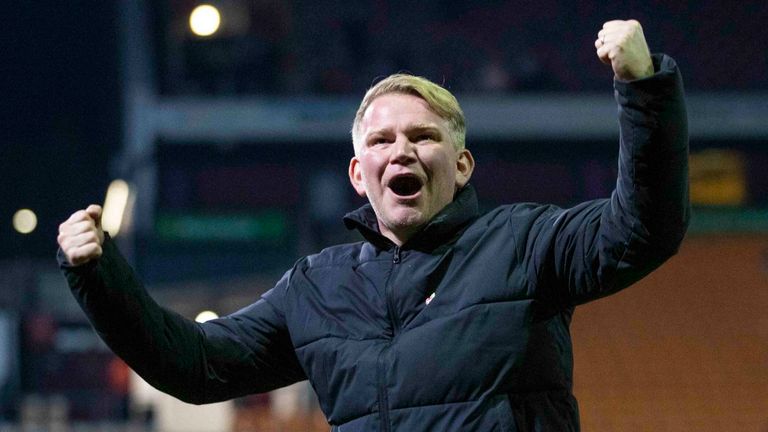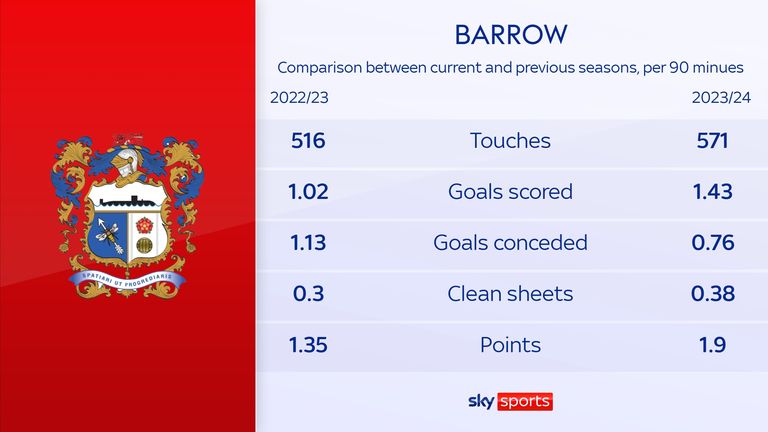Sky Sports exclusive: Barrow’s Pete Wild on coming into football from ‘real life’, why the club are based in Manchester, prioritising a high point-per-game average as the Bluebirds target promotion from Sky Bet League Two and more.

Until promotion from the National League in 2020, Barrow had spent 48 years outside the EFL.
For generations, the Cumbria-based club bounced between the fifth and sixth tier of English football, unable to climb back up after relegation from the Fourth Division in 1972.
Once they eventually did, they struggled. In 2020/21, they finished 21st and escaped relegation by five points; in 2021/22 they came 22nd, with a six-point cushion above the bottom two.
Then they turned in a new direction, with the appointment of Pete Wild.

Image: Pete Wild was named Sky Bet League Two Manager of the Month for November
- Pete Wild wins Sky Bet League Two Manager of the Month
- LIVE League Two table | Barrow fixtures
- Stream the EFL and more with NOW | Get Sky Sports
At 39, the managerial career of the former Oldham and FC Halifax Town boss is still very much in its infancy, but do not mistake his age for a lack of nous or experience.
Wild has been coaching for over two decades and, under his guidance, the Bluebirds are dreaming higher than they ever have done before.
Ahead of Friday’s trip to Crewe, their last league match before Christmas, Barrow sit second in League Two, ahead of Hollywood-owned Wrexham on goal difference and only six points behind leaders Stockport, with a game in hand.
They have won six games on the trot and have not been beaten since October 3, so it will come as little surprise that Wild was named Sky Bet League Two Manager of the Month for November.
“I stand at the front and take the award, but everybody has pulled in the right direction over the last 18 months – we’re all in this together,” he tells Sky Sports.

“We have been building. It has been brewing in the background for the two months previously, but across the last month, we’ve seen a consistency; everyone who has been selected has stepped up to the plate and really delivered.”
Equally as impressive has been that – alongside Leeds and Mansfield – his side are one of only three in the EFL yet to lose at home this term. That and a points-per-game target have proven to be the driving force.
For context, Barrow have taken an average of 1.9 ppg this season; Cheltenham won League Two in 2020/21 with 1.78 and Forest Green did the same the following year with 1.83.
“The success of any club at any level is determined by their home form,” Wild continues.
“We identified in the summer that home is where the heart is and where we wanted to pick up a lot of our points. We put a little bit more pressure on ourselves at home to do well and we don’t want anyone to come to Barrow and have an easy ride.
Barrow's next five League Two fixtures
- Crewe (a) – December 22, 7.45pm
- Stockport (h) – December 26, 3pm
- Accrington (h) – December 29, 7.45pm
- Wrexham (a) – January 1, 3pm
- Tranmere (h) – January 6, 3pm
“Where we are in the league doesn’t really matter at the moment, though. We had a point-per-game target at the start of the season that we are above, so we’re all really pleased. The players and the staff have earned the right to be in conversations and games at the top end of the table.”
As a result of Barrow’s unique location on the west coast of England, a stone’s throw from the Lake District, the club have found it makes more sense to run their operations from Manchester, 100 miles down the M6.
In the summer, they agreed to hire FC United of Manchester’s facilities, in the north of the city, as their training ground. But the town has not been forgotten.
“Barrow is a unique football club, with a unique way of doing things,” says Wild. “We’re in Manchester for recruitment purposes, to try and get the best players we can to come to the football club.
“We travel up to Barrow the night before home games to play there and, once we’re in the town, the players do community work on a Friday, which has helped to galvanise the town and get everybody behind us. It has been a massive boost this season.”

Earlier this year, a B Team – arguably popularised in England by Brentford in 2016 – was established, too.
“We toyed with the idea of running an academy, but where we are based in the country and with the academies that are already established around us, we didn’t think that was financially viable,” he adds.
“We wanted regular games for the players who weren’t playing, so we looked last year at if a player was out of the team, it could be five or six weeks before they had a game. Then we wanted to develop some good young players to become football and financial assets for the football club.”
There is also the experience of missing out on the play-offs by 13 points last season, which has taught Wild and his staff valuable lessons.
“Adam [Temple, Wild’s assistant] and I learned a lot about the league, what the league needs and how to manage periods of the season. I don’t think we had the strength in depth in the squad and, towards the end of the season, we ran out of gas.
“The teams that ended up going up were the ones that really managed this middle part of the season really well.

Image: Barrow are only 23 points from their best ever return in a season – with 25 league games of the season remaining
“We did a massive reflective piece in the summer around styles of play, how we manage certain parts of the season, what do we go over as coaches at certain parts of the season, what does our strength in depth look like, how do we manage the squad. That has really helped us coming into this period now where we stalled last year.”
Wild has previously confirmed claims on his Wikipedia page that, before he turned coaching into a career, he worked as a tree surgeon, an apprentice mechanic and in his parents’ pubs.
When it is put to him that these experiences have set him up better than most for a job in professional football, he agrees wholeheartedly.
“Modern management is about leading people. All the experiences I’ve had have helped me develop my people skills and become able to talk to and communicate with people, which has really helped me. The start my family gave me in life and what they did to put me in these situations has been huge.
“I don’t take any day for granted at this level as it can end as quickly as it has come. I talk to my friends and family and we laugh that I can walk down the street and people know who I am! I find things like that surreal – I’m just Pete from Oldham, really!

“What comes with that is that I’ve got no anxieties or worries about it ending. When it does, like everything in life does, you move on and you do something else. I came from what some might call ‘real life’ and I’m happy to go back to real life when it all ends.”
If that sentiment does not already make it clear, with Wild, what you see is what you get. He has no ego, absorbs any knowledge he can – and the secret to his success is simpler than you might think.
“If ever I speak to a manager after a game – there are two or three I talk to more regularly – I talk to them about how they do it, how they’ve lasted so long and what the key is. I’m very much one of those people who listen and learn and if I can take half-an-inch of knowledge of somebody along the way, I’ll take it.
“In terms of football philosophy, If I’m really honest with you, I think your football philosophy changes whatever club you go to and whatever environment you work in.
“I would just say we are massive on getting the environment and the culture right. Get that right and it will eat any strategy for breakfast. That’s the secret to our success.”
Sourse: skysports.com






